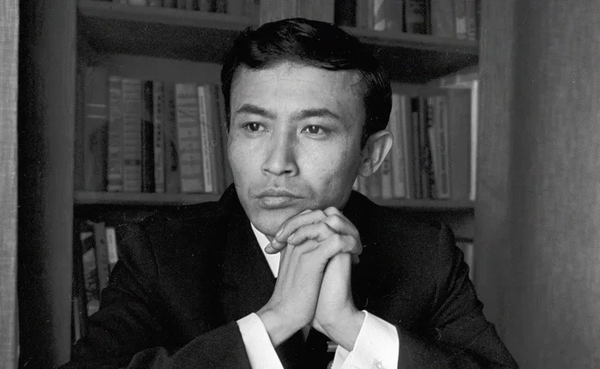Abdulla Oripov Poetry Impact on Uzbek Literature and Culture

Abdulla Oripov is considered one of the most significant figures in contemporary Uzbek literature and is known for his contributions to Uzbek poetry, including his experimentation with form and style.
His innovative use of language and form, combined with his exploration of universal themes, have helped to elevate the status of Uzbek poetry and make it more accessible to a wider audience
Oripov began writing poetry at a young age and published his first collection of poems, “The First Drop,” in 1960. He went on to publish numerous other collections of poetry throughout his career, including “Words on the Palm” (1964), “The Nightingale’s Song” (1969), and “The Threshold of Eternity” (1980), among others.In addition to his poetry, Oripov also worked as a journalist and served as the editor-in-chief of the literary magazine “Navbahor” from 1994 to 1999.
He received numerous awards for his contributions to literature, including the State Prize of Uzbekistan in 1992 and the Order of Friendship of Peoples in 2001.
Impact of Abdulla Oripov poetry
Abdulla Oripov’s poetry has had a significant impact on Uzbek literature and culture. His innovative use of language and form, combined with his exploration of universal themes, have helped to elevate the status of Uzbek poetry and make it more accessible to a wider audience.
One of the key ways in which Oripov’s poetry has had an impact is through its ability to capture the essence of the Uzbek experience. His poems often touch on themes related to identity, history, and tradition, and they offer readers a glimpse into the unique culture and perspective of the Uzbek people. In this way, Oripov’s poetry has helped to promote a greater understanding and appreciation of Uzbekistan and its people.
Another important aspect of Oripov’s impact is his role in shaping the development of Uzbek poetry. His experimentation with form and style, as well as his willingness to tackle a wide range of topics, has inspired generations of Uzbek poets to push the boundaries of what is possible in poetry. Many contemporary Uzbek poets cite Oripov as a major influence on their work, and his legacy continues to inspire new generations of writers.
Oripov’s impact extends beyond the borders of Uzbekistan
His poetry has been translated into numerous languages, including Russian, English, and French, among others, and has been featured in anthologies and literary journals around the world. In this way, Oripov’s work has helped to promote a greater understanding and appreciation of Uzbek literature and culture on a global scale.
Famous works
Some of his most famous works include:
- “The First Drop” (Birinchi qatir) – Oripov’s debut collection of poems, published in 1960.
- “Words on the Palm” (Qo’l ustida so’zlar) – A collection of poems published in 1964, which includes some of Oripov’s most well-known works, such as “The Song of the Nightingale” and “The Butterfly’s Flight.”
- “The Threshold of Eternity” (Abadiylikning esigi) – A collection of poems published in 1980, which explores themes related to life, death, and the search for meaning.
- “The Sun Above the Mountains” (Tog’lar ustida quyosh) – A collection of poems published in 1991, which reflects on the history and culture of Uzbekistan.
- “The Memory of Water” (Suvning xotira qoldirgan) – A collection of poems published in 2000, which explores the theme of memory and its relationship to the natural world.
These works, among others, have helped to establish Oripov as one of the most significant figures in contemporary Uzbek literature.
Theme of Birinchi qatir
“Birinchi qatir” (The First Drop) is Abdulla Oripov’s debut collection of poems, published in 1960. The collection contains 29 poems, many of which explore themes related to youth, love, and nature.
The collection’s overarching theme is the poet’s search for identity and purpose. The poems reflect on the experiences and emotions of a young man coming of age in a changing society. The poet grapples with questions of identity and belonging, as he tries to find his place in the world.
Many of the poems in “Birinchi qatir” also explore the theme of love, both romantic and platonic. The poet writes about the joy and pain of falling in love, as well as the beauty of nature and its ability to inspire feelings of love and wonder.
Other themes in the collection include the passage of time, the transience of life, and the power of memory. The poems in “Birinchi qatir” offer a window into the complex inner world of a young poet, grappling with the challenges and opportunities of life in a changing society.
Poetry about Nature and Love
Nature is a recurring theme in Abdulla Oripov’s poetry, and he often uses descriptions of the natural world to explore complex emotions and ideas. Some of his poems that focus on nature include:
- “The Butterfly’s Flight” (Parvoz-i parvona) – This poem, which appears in Oripov’s collection “Words on the Palm,” describes the flight of a butterfly and uses the imagery of nature to explore the theme of freedom.
- “The Nightingale’s Song” (Bulbulning qo’shiqlari) – This poem, also from “Words on the Palm,” describes the beauty of a nightingale’s song and uses nature imagery to explore the theme of love and longing.
- “The Sun Above the Mountains” (Tog’lar ustida quyosh) – This poem, from Oripov’s collection of the same name, describes the beauty of the sun rising over the mountains and uses nature imagery to explore the theme of history and the passage of time.
- “The Memory of Water” (Suvning xotira qoldirgan) – This poem, from Oripov’s collection of the same name, uses the imagery of water to explore the theme of memory and its relationship to the natural world.
Oripov’s poetry about nature is marked by a deep appreciation for the beauty and power of the natural world, as well as an understanding of the ways in which nature can inspire and illuminate the human experience.
Love is a prominent theme in Abdulla Oripov’s poetry. His poems explore love in all its forms, from romantic love to the love of nature and the love of life itself. Some of his most famous love poems include:
- “I Will Wait” (Kutaman) – This poem, from Oripov’s collection “Towers in the Desert,” describes the speaker’s longing for a loved one and his determination to wait for them no matter how long it takes.
- “The Rose” (Gul) – This poem, from Oripov’s collection “The Sun Above the Mountains,” uses the image of a rose to explore the theme of love and its power to transform our lives.
Overall, Oripov’s poetry about love is marked by a deep sensitivity to the emotions and experiences of the human heart. He uses imagery from the natural world and everyday life to capture the complex and often contradictory nature of love, and to celebrate the power of love to inspire, challenge, and transform us.

